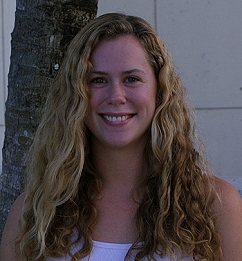![]()
![]()
 Marilyn
Brandt
Marilyn
Brandt
Ph.D. Candidate, Marine
Rosenstiel School for Marine and Atmospheric
Science
University of Miami
email:
[email protected]
Coral diseases are now recognized as an important threat to the survival of coral reefs, most especially in the Caribbean region. The impact of disease on coral populations has proven devastating in some cases. For example, White Band disease is thought to have contributed significantly to the loss of Acropora spp. in the shallow reef environments of the Caribbean and diseases such as Black-band and White Plague have caused major changes in the coral communities of some reef areas. This situation could become even more serious in the near future as human activity increases the virulence of disease in the marine environment. It is therefore important to understand how the dynamics of coral diseases are affected by the environment and in turn, how disease plays a role in shaping the structure of coral reefs.� Due to the limitations of studying coral diseases in situ (e.g. the rarity of disease and the limits of SCUBA), the development of epidemiological models supported by quantitative data is necessary.
|
|
|
|
|
|
|
|